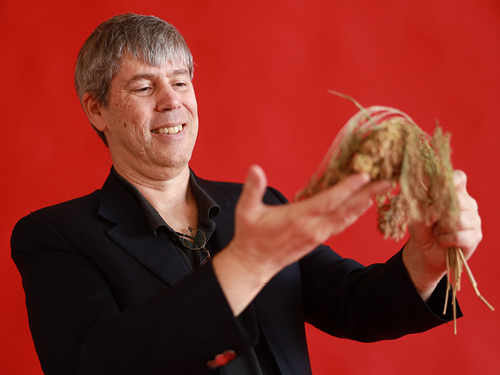Teams of Iowa State researchers are creating a whole new paradigm in plant breeding, one that maximizes agricultural productivity at the critical intersection of sustainable agriculture, bioenergy and food security.
For more than a century, Iowa State University’s plant breeding programs have improved the productivity and quality of crops for farmers, enabling the Midwest to lay claim to feeding the world.
Today, researchers at Iowa State are using the latest technologies to usher in a new era of plant breeding, one that maximizes agricultural productivity at the critical intersection of sustainable agriculture, bioenergy and food security – and greatly enhances quality of life for our growing global population.
A new paradigm in plant breeding
Take Asheesh Singh, a soybean breeder and professor in Iowa State’s agronomy department. Singh and his team dive deep into soybean germplasm, exploring root and above-ground traits to identify resistance to multiple diseases and pests and build better beans. The goal: high-yielding cultivars suited to northern climates with an ability to handle weather extremes and excel with fewer inputs. Their approach – creating hardware and software tools and solutions in collaboration with engineers and computer and data scientists – represents a whole new paradigm in plant breeding, particularly variety development.
Elsewhere on campus, Patrick Schnable, a Charles F. Curtiss Distinguished Professor in Agriculture and Life Sciences and Iowa Corn Promotion Board Endowed Chair in Genetics, and other agricultural researchers are also partnering with engineers and computational scientists. They’re looking at massive amounts of data to create systems and models to predict yield.
“For example, we seek to predict the performance of a given corn hybrid in a specific field under a specific set of agronomic practices,” explains Schnable, who also directs Iowa State’s Plant Sciences Institute.
One has only to look at what a cold, rainy spring can do to corn plants, or how much damage a dry, hot summer can have on corn production. “The ability to make accurate predictions of this type will enable farmers to select the optimal hybrids for a given field in a given year.”

— Patrick Schnable, a Charles F. Curtiss Distinguished Professor in Agriculture and Life Sciences and Iowa Corn Promotion Board Endowed Chair in Genetics
Rooted in a tradition of excellence
For Singh, Schnable and the growing corps of collaborators across campus, it’s about more than extending the long tradition of excellence in plant breeding at Iowa State.
“The results of these collaborations promise to be both exciting and wide-reaching,” Schnable says. “They will advance our understanding of biological processes. They will revolutionize our ability to create crops that exhibit enhanced resilience to variable weather patterns associated with global climate change, helping to ensure a plentiful and stable supply of food and feed. And they offer substantial new opportunities for Iowa State to contribute to economic development in Iowa, the Midwest and beyond.”








